-

人教版新目标初中英语九年级下册Could you please tell me where the restrooms are教案
Step Ⅰ RevisionCheck homework. Ask a few students to read the article in 3a.Then ask a few students to read their guides.Step Ⅱ Part 1Look at the words in the box. Ask a student to read them. Make sure the students understand the meaning of the words. You are to fill in the blanks with the words. In some cases, students may need to use another form of the word, for example adjusting for tense or subject/ verb agreement.Ask students to fill in the blanks on their own.Check the answers. Step ⅢPart 2Go through the instructions with the class.Look at the example with the students.Ask students what the answer would be.Ask a student to read the question and answer it.Excuse me, could you tell me where the bank is, please?The bank is across the street from the shopping malt.Get students to complete the work in pairs.Check the answers. Ask a few students to read their questions.Step Ⅳ Just for Fun!Ask all the students to read the conversation. Ask: What is funny about this cartoon? Help students to explain. A Martian is a person from the planet Mars.There is no such thing as Martian food on Earth, and the clerk looks silly because he is trying to think of where there is a Martian restaurant.Invite some pairs of students to present this conversation to the rest of the class.Step Ⅴ Summary and HomeworkIn this class, we’ve done much writing practice using the key vocabulary words and the target language presented in this unit. After class, please finish the questions in 2 in your exercise books. Then finish the exercises on pages 47~48 of the workbook as well.The Seventh Period Ⅰ Teaching Aims and Demands1. Knowledge Objects(1) Key Vocabularyimage, adventure, jealousy, hero, crime, journey, brave, no longer, show interest in, take it easy, become interested in, plain looks(2)Text:Grown-ups like cartoons, too.2. Ability Objects(1) Fast-reading to get a general idea of the text.(2) Careful-reading to get the detailed information in the text.

人教版新目标初中英语九年级下册I’ll help clean up the city parks教案
Talk about offering help (P60)I’ll help clean up the city parks.A: I’d like to work ...B: You could help ...Talk about ways to tell people about the Clean-Up Day (P61)We need to ...We can’t ...I’ll ...Talk about the work the volunteers do (P62)These three students all volunteer their time to help other people.Somebody loves to ... / helps ... / plans to ... / wants to ...A: What do you like doing?B: I like ... A: What kind of volunteer work do you think I could do?B: You could ...1. 重点词汇advertisement, fix, repair, pleasure, blind, deaf, shut, carry, specially, fetch2. 认读词汇hunger, homeless, cheer, clean-up, sign, establish, major, commitment, elementary, veterinarian, coach, similar, call-in, strategy, disabled, organization, unable, support, appreciate, donation, part of speech, pronoun, adverb, preposition, conjunction, donate, Jimmy, Sally3. 词组clean up, cheer up, give out, put off, set up, think up, take after, fix up, give away, put up, hand out, work out, at once

人教版新目标初中英语九年级下册We’re trying to save the manatees教案2篇
本单元主要围绕着有关濒临灭绝的动物这一话题,学习了应该怎样保护我们的环境,以及就某一问题展开辩论。目标提示语言目标能够运用所学知识,就某一问题展开辩论。认知目标1、复习一些语法:现在进行时、一般现在时、用used to 表示一般过去时、现在完成时、一般过去时的被动语态。2、学会表达同意和不同意。3、学会以下基本句型:We’re trying to save the manatees.Manatees eat about 100 pounds of food a day.There used to be a lot of manatees.In 1972,it was discovered that they were endangered.Some of the swamps have become polluted.情感目标了解一些濒临灭绝的动物的生活习性和濒临灭绝的原因,教育学生应该如何保护环境。教学提示充分利用多媒体等教学设备,创设与本课话题相关的情境,如各种不同种类的动物、动物园以及有关环境的画画等等。围绕着本单元的教学目标,设计一些贴近学生实际的教学任务,如让学生谈论自己最喜欢的动物,如何拯救濒危动物,如何保护环境等等。让学生根据所学知识,就动物园是否对动物有利以及其他的话题进行辩论。

人教版新目标初中英语九年级下册You’re supposed to shake hands教案
教学目标:1. 掌握本单元一些重点词汇的写法和用法。2. 学会自如谈论餐桌礼仪。Step 1 RevisionAsk some students to retell the customs at the table in France in the passage in 3a.Step 2 Self checkPart 1. Fill in each bland with the correct word given. Students do the exercises by themselves at first. Then check the answers. Ask the students to comprehend the sentences and help them point out uses of some words, like “arrive (at / in) sw., spend time / money on sth , spend time / money (in) doing sth.”Part 2. Read about Fan Ling’s experience in a western restaurant. Understand the passage. Point out some key points in the passage.1. be / get used to doing sth. 习惯做某事2. begin with = start with 以….开头3. crowd v. 挤满,塞满 the crowd 人群 crowded adj. 拥挤的Then students discuss about how she would solve her problem. Ask some to share their stories with others.Part 3. Complete the crossword by looking at the sentences on the left. Then check the answers.

新人教版高中英语必修1Unit 1 Teenage Life-Listening and Speaking & Listening and Talking教案
Step 2 Listening and Talking1. The teacher is advised to talk with their new students about the related topic: Boys and girls, do you know some structures to talk about future activities? Talking about future activitiesWe’ll …I plan to …There’ll be …I hope to …We’re going to …2. After their small talk, the teacher can move on by playing the listening and solve the following task.Underline the expressions in the sentences below Cao Jing and Max use to talk about the future.We’ll learn useful skills.I plan to improve my spoken English.There’ll be students from different schools.I hope to make new friends.We’ll talk about teenage life.I’ll learn to make a fire.There’ll be students from different countries at the camp.There’ll be some experts there to show us how to live in the wild.We’re going to learn about wildlife.I’m going to give a speech.I think I’m going to enjoy the activities.I think we’ll have a lot of fun.3. Work in groups. Plan a youth camp.Teacher make the Ss think of ideas for the camp. And they can use the questions below to get started. And have the Ss present their ideas for a youth camp to the class.●What kind of camp is it?●Who will be there?●What will they do?●What will they learn?

新人教版高中英语必修1Unit 2 Travelling Around-Listening and Speaking & Listening and Talking教案
【教学目标与核心素养】1. Instruct students to get main facts by listening and motivate them to talk about the topics about how to prepare for the trip and make reservations by listening and ultimately can make travel arrangements and reservations. 2. Develop students’ sense of cooperative learning and individual thinking capability. 3. Develop students’ different listening skills to solve different listening comprehensive problems.4. Help students to understand how to use the structures “the present continuous tense (be doing) is used to express future plans.【教学重难点】1. Teach students how to focus on key words, not on single words or grammar.2. Prompt Ss to talk about the related topics, such as how to prepare for the trip and make a travel plan.【教学过程】Step 1: Listening and SpeakingLead inThe teacher is advised to talk with their students about the places that they want to travel most both at home and abroad: boys and girls, if you have a chance to travel around the world, where will you go? After their small talk, the teacher can move on by finishing the following listening task:Before travelling, what do we need to prepare for the trip?

新人教版高中英语必修1Unit 3 Sports and Fitness-Listening and Speaking & Listening and Talking教案
Finally, after finishing the task above, the teacher is expected to instruct students to work in groups to finish the following project:Speaking ProjectWhat event or activity would you like to invite your friend to? Make a conversation with a partner.Ski Race: Zhangjiakou, a beautiful city in northern China, will host the Youth Ski Race in December.Track Meet: a great event for track –and –field lovers on 26 October.Gym Class: come and work out at a gym! You can make it.Part 2: Listening and Talking:The teacher is advised to talk with their new students about the related topic: Boys and girls , what do you think of sportsmanship? Let’s listen and find out:Play the listening and match each opinion with the right speaker. Who do you agree with? Why?Cao Jing _____________ Lily _____________ Max _____________A. An athlete should do his/her best to win.B. The girl should stop and help the other girl. Good sportsmanship is more important than wining!C. An athlete should think about honor and his/her fans if he/she is competing for his/her country.Listen again and circle the expressions that you hear in the conversation.

新人教版高中英语必修1Unit 3 Sports and Fitness- Discovering Useful Structures—tag questions教案
【教材分析】This teaching period mainly deals with the grammar: tag questions.This period carries a considerable significance to the cultivation of students’ spoken English. The teacher is expected to enable students to master this period thoroughly and consolidate the knowledge by doing some exercise of good quality.【教学目标与核心素养】1. Get students to have a good understanding of the basic usages of tag questions.2. Enable students to use the basic phrases structures flexibly.3. Develop students’ speaking and cooperating abilities.4. Strengthen students’ great interest in grammar learning.【教学重难点】1. How to enable students to have a good understanding of the basic usages of tag questions.2. How to enable students to use the basic usages of tag questions flexibly.【教学过程】Step1: 语法自主探究一、基本组成方法1.肯定式陈述部分+否定附加疑问部分(前肯后否) You often play badminton, don’t you? 你经常打羽毛球,是吗?You are going to the gym with me, aren’t you?你要和我一起去健身房,是吗?She’s been to shanghai before, hasn’t she? 她以前去过上海,是吗?2.否定式陈述部分+肯定附加疑问部分(前否后肯) It isn't a beautiful flower, is it? 那不是美丽的花,是吗?You didn't go skating yesterday, did you? 你昨天没去滑冰,是吗?They can’t finish it by Friday, can they?他们不能在星期五之前完成,是吗?
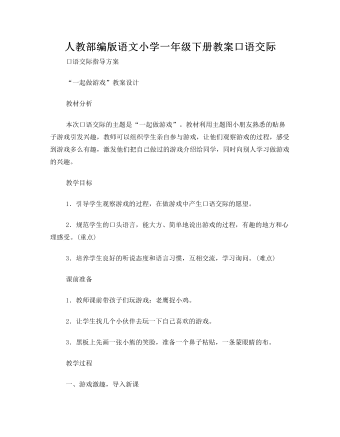
语文小学教案口语交际
分组讨论,交流体会师:小朋友们玩得开心吗?生:太开心了!师:把你最开心的地方说给小组的其他小朋友听一听好吗?每一个小组选一个说得最好的在班上交流。生1:我刚才和我同桌玩的是“反口令”游戏。这个游戏很简单,就是按照口令相反的动作做才对。比如刚才,我让他“摸左耳”,他就得摸右耳,又让他“抬左腿”,他就得抬右腿。当我说道“闭左眼”的时候他就听话了,哈哈!结果他就是这么失败的!生2:这个游戏真考验人的反应啊!生3:我们六个人玩的是“蹲蹲游戏”。我们每个人代表一个词语:萝卜、白菜、西瓜、土豆、苹果、橘子。我们站成一排,我代表萝卜,我就一边蹲一边先喊:“萝卜蹲,萝卜蹲,萝卜蹲完西瓜蹲。”代表西瓜的人马上就得接上,一边蹲一边随机指定下个人:“西瓜蹲,西瓜蹲,西瓜蹲完苹果蹲。”然后就这样代表苹果的同学再往下接力,谁没接上谁就输了。
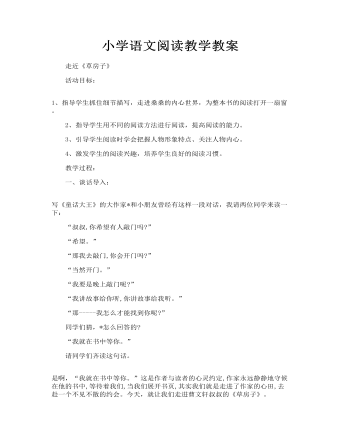
小学语文阅读教学教案
一、谈话导入: 写《童话大王》的大作家*和小朋友曾经有这样一段对话,我请两位同学来读一下: “叔叔,你希望有人敲门吗?” “希望。” “那我去敲门,你会开门吗?” “当然开门。” “我要是晚上敲门呢?” “我讲故事给你听,你讲故事给我听。” “那-----我怎么才能找到你呢?”
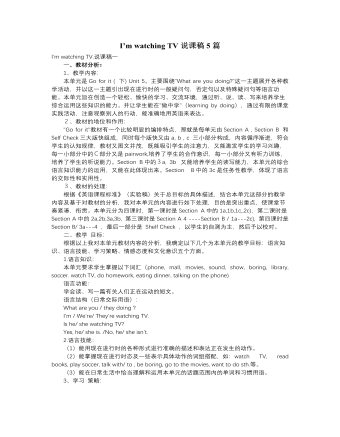
人教版新目标初中英语七年级下册I’m watching TV说课稿5篇
“Go for it”教材有一个比较明显的编排特点,那就是每单元由Section A , Section B 和 Self Check三大版快组成,同时每个版快又由a, b , c 三小部分构成,内容循序渐进,符合学生的认知规律,教材又图文并茂,既能吸引学生的注意力,又能激发学生的学习兴趣,每一小部分中的C部分又是pairwork,培养了学生的合作意识,每一小部分又有听力训练,培养了学生的听说能力。Section B中的3a, 3b 又能培养学生的读写能力,本单元的综合语言知识能力的运用,又能在此体现出来。本单元是新目标英语七年级下 Unit 5。主要围绕“What are you doing?”这一主题展开各种教学活动,并以这一主题引出现在进行时的一般疑问句,否定句以及特殊疑问句等语言功能。本单元旨在创造一个轻松、愉快的学习、交流环境,通过听、说、读、写来培养学生综合运用这些知识的能力。并让学生能在“做中学”(learning by doing),通过有限的课堂实践活动,注意观察别人的行动,能准确地用英语来表达。
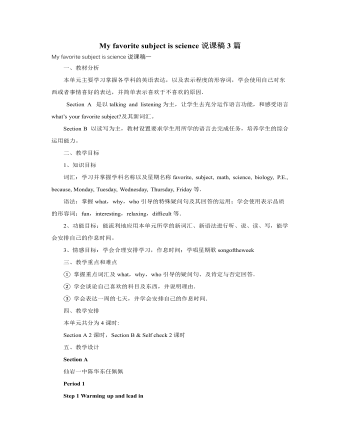
人教版新目标初中英语七年级上册My favorite subject is science说课稿3篇
(四)、归纳总结就学生在语言实践中出现的问题及时进行归纳总结,提醒学生关注。(五)、应用性操练1、填空、(旨在培养学生运用所学知识灵活解决问题的能力。)2、根据问话写答语和根据答语写问话(让学生在理解的基础上灵活运用所学知识,并且有意识地拓展学生思维,让学生不局限于一种答案。)3、翻译句子(旨在培养学生综合运用语言的能力和逻辑思维能力,有意识的培养学生的语感。)八、拓展性训练最后,我设计了这样一个活动,让学生就“最喜欢的动物”“最喜欢的城市”“最喜欢的学科”“最喜欢的季节”“最喜欢的演员”“最喜欢的……”等方面去调查身边的同学,这项活动将学生从最喜欢的学科和老师引向最喜欢的其它事物,引导学生联系上学期所学过的动物、城市、和季节,一方面加强了旧知识和新知识之间的联系,另一方面也拓展了学生的思维,引导学生多角度,多方位的去考虑问题。
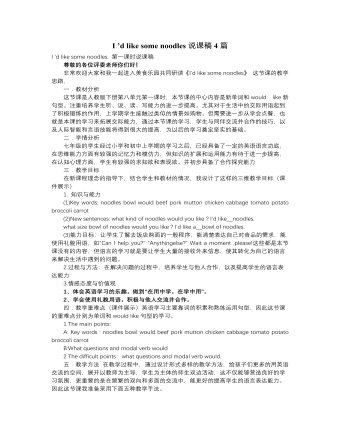
人教版新目标初中英语七年级下册I ’d like some noodles说课稿4篇
《I'd like some noodles》是人教板新目标七年级下册第八单元内容。本节课的中心内容是新单词和would like 句型表达法。注重培养学生听、说、读、写能力的进一步提高,尤其对于生活中的交际用语起到了积极的作用。通过本课的学习,学生可以拓展交际能力,提高与同伴交流并合作的技巧,以及言语技能,为以后的学习奠定坚实的基础。 (2)教学目标 七年级的学生经过小学和初中上学期的学习后,已经具备了一定的英语语言功底,在思维能力方面有较强的记忆力和模仿力,但知识的扩展和运用能力有待于进一步提高,加之在《课程目标》指导下,结合学生和教材的情况,我设计了这样的三维教学目标(课件展示) a 知识目标 重点词汇:noodles, beef ,mutton, chicken, cabbage, tomatoes, potatoes. 重点句型:What kind of noodles would you like? I'd like beef and tomato noodles. What size of noodles would you like? I'd like a large\medium\small bowl of noodles. b 能力目标:培养运用英语交际的能力,让学生把所学到的语言知识和生活实际联系起来,使学习过程生活化。培养学生探究、合作的参与意识。
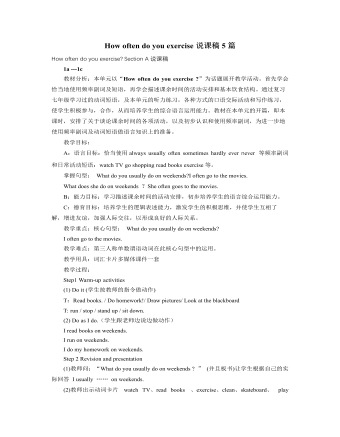
人教版新目标初中英语八年级上册How often do you exercise说课稿5篇
1a ---1c教材分析:本单元以“How often do you exercise ?”为话题展开教学活动。首先学会恰当地使用频率副词及短语,再学会描述课余时间的活动安排和基本饮食结构。通过复习七年级学习过的动词短语,及本单元的听力练习,各种方式的口语交际活动和写作练习,使学生积极参与,合作,从而培养学生的综合语言运用能力。教材在本单元的开篇,即本课时,安排了关于谈论课余时间的各项活动,以及初步认识和使用频率副词,为进一步地使用频率副词及动词短语做语言知识上的准备。教学目标:A:语言目标:恰当使用always usually often sometimes hardly ever never 等频率副词和日常活动短语:watch TV go shopping read books exercise等。掌握句型: What do you usually do on weekends?I often go to the movies.What does she do on weekends ?She often goes to the movies.B:能力目标:学习描述课余时间的活动安排,初步培养学生的语言综合运用能力。C:德育目标:培养学生的逻辑表述能力,激发学生的积极思维,并使学生互相了解,增进友谊,加强人际交往,以形成良好的人际关系。
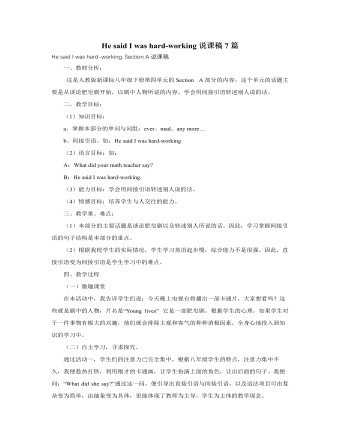
人教版新目标初中英语八年级下册He said I was hard-working说课稿7篇
三、教学重、难点:(1)本部分的主要话题是谈论肥皂剧以及转述别人所说的话。因此,学习掌握间接引语的句子结构是本部分的重点。(2)根据我校学生的实际情况,学生学习英语起步慢,综合能力不是很强。因此,直接引语变为间接引语是学生学习中的难点。四、教学过程(一)激趣课堂在本活动中,我告诉学生们说:今天晚上电视台将播出一部卡通片,大家想看吗?这些就是剧中的人物,片名是“Young lives” 它是一部肥皂剧。根据学生的心理,如果学生对于一件事物有极大的兴趣,他们就会排除主观和客气的种种消极因素,全身心地投入到知识的学习中。(二)自主学习,寻求探究。通过活动一,学生们的注意力已完全集中,根据八年级学生的特点,注意力集中不久,我便趁热打铁,利用刚才的卡通画,让学生扮演上面的角色,让出后面的句子。我便问:“What did she say?”通过这一问,便引导出直接引语与间接引语,以及语法项目可由复杂变为简单,由抽象变为具体,更能体现了教师为主导,学生为主体的教学现念。
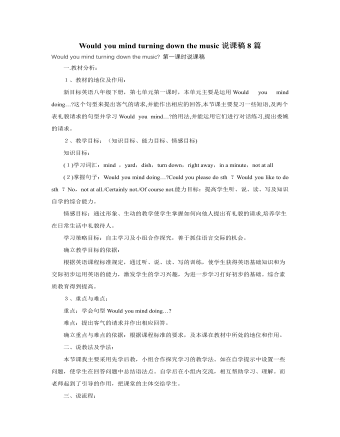
人教版新目标初中英语八年级下册Would you mind turning down the music说课稿8篇
一.教材分析: 1、教材的地位及作用:新目标英语八年级下册,第七单元第一课时,本单元主要是运用Would you mind doing…?这个句型来提出客气的请求,并能作出相应的回答,本节课主要复习一些短语,及两个表礼貌请求的句型并学习Would you mind…?的用法,并能运用它们进行对话练习,提出委婉的请求。2、教学目标:(知识目标、能力目标、情感目标)知识目标:(1)学习词汇:mind ,yard,dish,turn down,right away,in a minute,not at all(2)掌握句子:Would you mind doing…?Could you please do sth ?Would you like to do sth ?No,not at all./Certainly not./Of course not.能力目标:提高学生听、说、读、写及知识自学的综合能力。情感目标:通过形象、生动的教学使学生掌握如何向他人提出有礼貌的请求,培养学生在日常生活中礼貌待人。学习策略目标:自主学习及小组合作探究,善于抓住语言交际的机会。
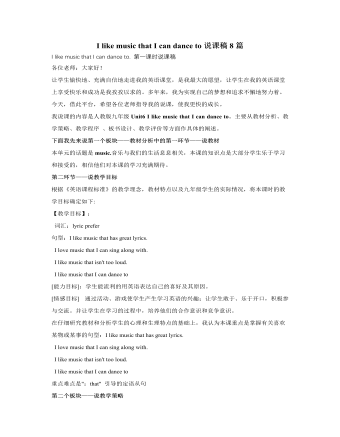
人教版新目标初中英语九年级上册I like music that I can dance to说课稿8篇
2、 难点结合功能句进行听力练习。确定目标的根据新课程标准规定,通过听、说、读、写的训练,使学生获得英语基础知识和初步运用英语进行交际的能力,激发学生的学习兴趣,为进一步的学习打基础。此外,根据我国国情及新课程标准的要求,现阶段英语教学的素质主要包括思想素质教育,潜在英语能力的培养,非智力因素的培养等几个方面。而我们班的学生本身英语基础不太好,部分学生已经对英语失去了信心,还有一部分学生觉得英语越来越难,渐渐力不从心了,不感兴趣了,上课注意力也不集中了。针对这种情况,备课时要增加趣味性,以此来提高学生对英语的学习兴趣。二、教法学法1、 教法:采取“任务型”教学法。教师根据本节课内容,安排合适的任务,让学生在完成任务的过程中达到本节课所拟定的目标。
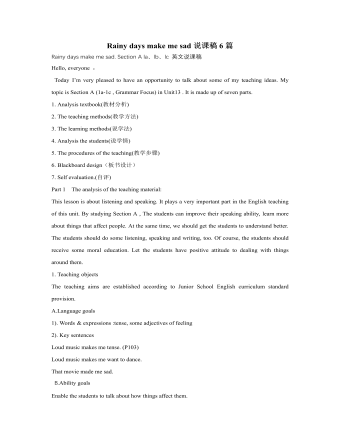
人教版新目标初中英语九年级下册Rainy days make me sad说课稿6篇
Today I’m very pleased to have an opportunity to talk about some of my teaching ideas. My topic is Section A (1a-1c , Grammar Focus) in Unit13 . It is made up of seven parts.1. Analysis textbook(教材分析)2. The teaching methods(教学方法)3. The learning methods(说学法)4. Analysis the students(说学情)5. The procedures of the teaching(教学步骤)6. Blackboard design(板书设计)7. Self evaluation.(自评)Part 1 The analysis of the teaching material:This lesson is about listening and speaking. It plays a very important part in the English teaching of this unit. By studying Section A , The students can improve their speaking ability, learn more about things that affect people. At the same time, we should get the students to understand better. The students should do some listening, speaking and writing, too. Of course, the students should receive some moral education. Let the students have positive attitude to dealing with things around them.1. Teaching objectsThe teaching aims are established according to Junior School English curriculum standard provision.A.Language goals 1). Words & expressions :tense, some adjectives of feeling 2). Key sentences Loud music makes me tense. (P103)Loud music makes me want to dance.That movie made me sad.B.Ability goals Enable the students to talk about how things affect them.Emotion & attitude goals Enable the students to understand the effect of things upon them.
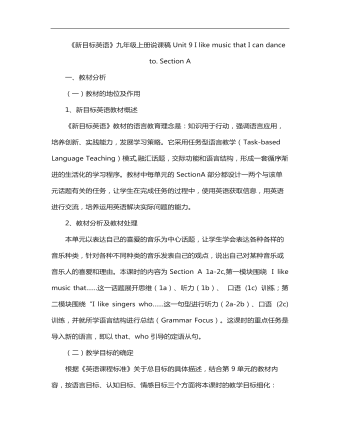
初中英语人教版九年级全册《Unit 9 I like music that I can dance to》说课稿
2、教材分析及教材处理本单元以表达自己的喜爱的音乐为中心话题,让学生学会表达各种各样的音乐种类,针对各种不同种类的音乐发表自己的观点,说出自己对某种音乐或音乐人的喜爱和理由。本课时的内容为Section A 1a-2c,第一模块围绕 I like music that……这一话题展开思维(1a)、听力(1b)、 口语 (1c) 训练;第二模块围绕“I like singers who……这一句型进行听力(2a-2b)、口语 (2c) 训练,并就所学语言结构进行总结(Grammar Focus)。这课时的重点任务是导入新的语言,即以that、who引导的定语从句。
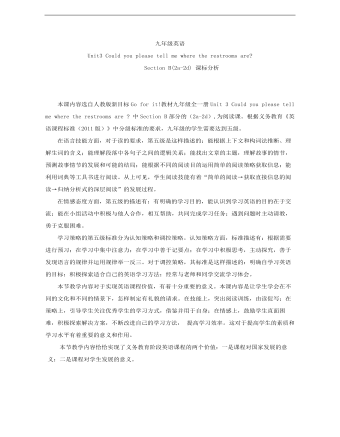
初中英语人教版九年级全册《Unit 3 Could you please tell me where the restrooms are》课标分析说课稿
学习策略的第五级标准分为认知策略和调控策略。认知策略方面,标准描述有:根据需要进行预习;在学习中集中注意力;在学习中善于记要点;在学习中积极思考,主动探究,善于发现语言的规律并运用规律举一反三。对于调控策略,其标准是这样描述的:明确自学习英语的目标;积极探索适合自己的英语学习方法;经常与老师和同学交流学习体会。